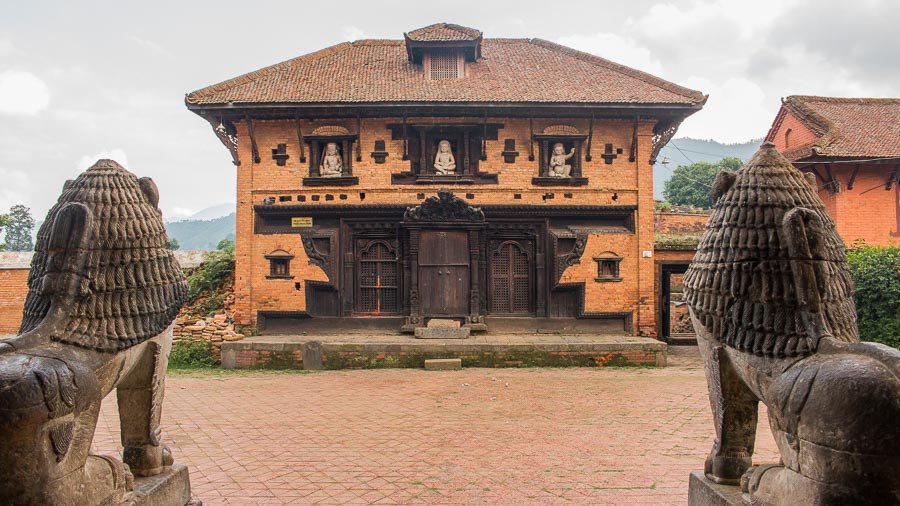Game of Thrones, the most watched and downloaded T.V show today is although fictional and part fantasy, it has the whole world enchanted and right now may actually have a loose but one of the biggest knit of cult followers. Dragons, zombies, bringing the dead back to life, among other flights of fantasies add flavour to the scheme and twisted plot filled storyline. But the cream everyone is hooked on have ingredients that can be scientifically traced back to real historical events. In fact, anyone who has gone through the famous pages of Machiavelli and Tolstoy can vouch for the plot lines and dirty schemes that resemble the reality of ancient politics. Such great patches of brutal reality are precisely the ingredients that have hooked adults from all walks of life. Even well known and serious political commentators have youtube videos of commentary and reviews for almost every single episode of GOT.
It’s a well-known fact now that many of the events in the series are inspired from actual historical occurrences along with other historical characters, massacres, weapons, and even the customs and traditions of ancient world. Twisted plots, murders, massacres, and wars are as old as human civilization itself, but some leave lasting legacies. Such game of thrones has been played everywhere in the world at some point in history. Nepal too had its share of equally brutal murders and massacres among others things. In fact too many in our opinion for a country so small. Commonalities are abundant and we have made comparisons with Game of Thrones to facilitate better understanding for readers by associating our history with something audiences can relate to.
Iron Bank of Bravos: British East India Company, a powerful and wealthy organization with commercial interest at its heart. The organization was the hidden hegemon of South Asia in its days. It’s each and every action and policy was driven by trade and profits. Its interest in Nepal revolved around the great commercial potential of the trade routes that connect India with Tibetan plateau and further to mainland China and Central Asia. Its political interests in Nepal were mere to ensure the Nepali regime remained friendly to its commercial interests. The company made new kings and removed old ones to ensure its interests were served. Behind the scenes, it was the wealthy party who always seemed to win even at the expense of everybody else.
Contradictory to the popular notion, they fought mostly by offering weapons and gold or even striking strategic alliances that sometimes were cemented by trade agreements. Conducting expeditionary diplomacy was also one of their better-known methods. Wars were always the last resorts and their military too was fully under control of the company itself rather than politicians. Also, they did not conquer and directly rule all the lands they were profiting from. Instead, they just ensured all big and small regimes within their commercial realms were their puppets and their armies commanded by British officers.
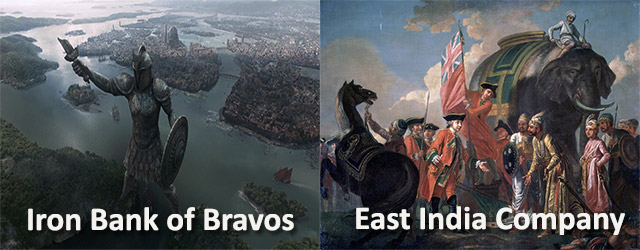
In Nepal, the company covertly manipulated the political environment to promote Bhimsen Thapa and then oust him when he turned hostile to the company. Eventually, they got their Yes-Man in the form of Jung Bahadur Rana.
Aegon Targaryen: Yakshya Malla, the king who conquered and united small states. Malla dynasty lasted many centuries and had many glorious days but eventually brought to an end by another Lord of a different house.
Aerys Targaryen (The Mad King): Rana Bahadur Shah was known as the Mad King of Nepal. Unlike in Game of Thrones, his dynasty did not end with him, but on his command, hundreds of people were killed, a lot of them being priests but they were not burned to death. Crowned at the age of two and a half after the death of his father, he was pampered in luxury. One of his first acts after assuming power was to imprison his uncle Bahadur Shah who also served as regent when the King was still too young. Bahadur Shah was a capable leader who managed to expand Nepal’s boundaries, continuing his father’s project. With this, the mad king antagonized many courtiers and aristocrats. He married a widow and declared his newly born son from the marriage the crown prince despite already having a crown prince from his first wedlock. After the death of his beloved wife, he killed more priests and destroyed many temples. He voluntarily abdicated the throne and tried to become a monk but decided to go back to being king after just a few months. Courtiers not wanting the mad king again stopped his comeback attempt. Self-exiled to Varanasi, India, he soon found favor with the British and partially backed by the British, reclaimed the throne with the help of Bhimsen Thapa. He assassinated Damodar Pande, then prime minister. When he threatened his half-brother whom the king himself had just promoted to a high position, Sher Bahadur Shah drew his khukuri and slaughtered the Mad King: a proper end but perhaps but a bit too late.
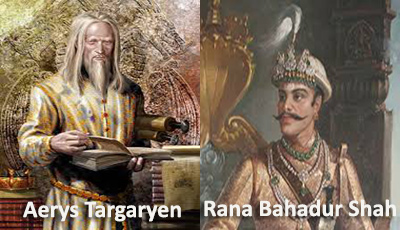
Robert Baratheon: Rajendra Bir Bikram Shah, thanks to his zero governance policy, his rule was weak, and it allowed the queen and other courtiers to run the show keeping the king in sidelines just like when Cersei Lannister weaved her plots in season 1 and became the character everybody loves to hate. The bad and absent leadership of both his grandfather Rana Bahadur Shah and Rajendra respectively allowed for the chaos that killed hundreds of political and military leaders. Unlike Rajendra, Robert was actually a great warrior and proven military leader who lead a successful rebellion to overthrow the ruling dynasty but the particular fact can be overlooked here for other lesser qualities of the two men would lead to what we now know as a bitter part of our history.
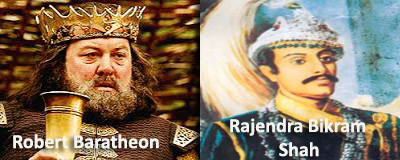
Ned Stark: Fatteh Jung Shah (Chautariya), the Prime Minister known for his loyalty to the crown but killed in order of the queen in a power struggle for next kin to the throne. The way he was killed was probably not as gruesome as beheading in front of the public and putting the head on a spike. But like Ned, he gets entangled in an operation to remedy problems started by the Queen’s infidelity. For the prestige of the throne, under the order of the then King and two Princes, he heads the operations which obviously infuriates the queen later on. The queen’s illicit lover is killed but who actually ends up killing him is revealed only after it’s too late to avoid severe consequences.
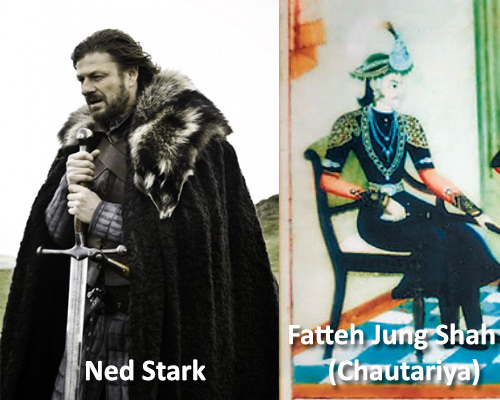
Cersei Lannister: Queen and later Queen Regent, responsible for the assassination of loyal Prime Minister, which started the chain reaction of chaos, war, and murders that will doom the nation for a long time. Also suspected of infidelity but in this case not with her own brother but a courtier whom she apparently loved very much. She is Rajya Laxmi Devi Shah. She would be sidelined by the very person she pulled up to the powerful position in the hope he would blindly follow her orders (Jung Bahadur Rana); one more commonality she has with Queen Cersei.
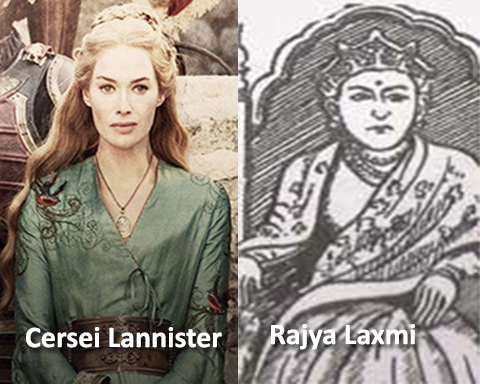
Jaime Lannister: Gagan Singh Bhandari was rumored to be the Queen’s lover, the General held more sway than Prime Minister Fatteh Jung Shah. The General had seven regiments under his command while the Prime Minister had just three. Though not by official measures, Jamie too was more powerful in many ways than the Hand of King in Game of Thrones, Ned Stark.
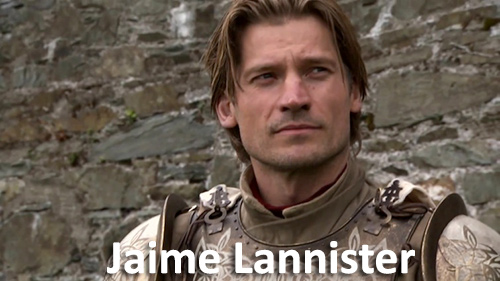
Joffrey Baratheon: The slot goes to none other than Surendra Bir Bikram Shah, Crown Prince and later the King, was known for his erratic nature that today would qualify him as a psychopath. An incompetent ruler whose reign was dictated first by her erratic mother, Queen Rajya Laxmi and later by then equivalent hand of the king. He made his personal guards put their lives at risk to perform stunts for cheap thrills. Ordering his guards to jump into deep wells, from the tall building with a big umbrella, and into the raging river with a horse are just some of many insane acts he enjoyed; Joffrey had fun torturing animals and people, but the underlying currents of both were their psychopathic nature. He did not die from poisoning at a young age but lived a fairly long life.
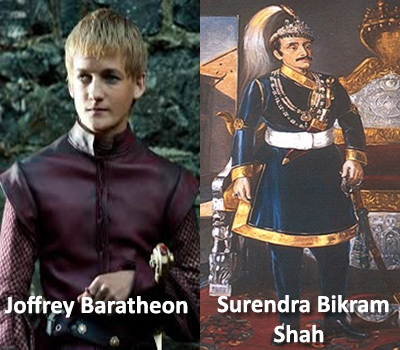
Tywin Lannister: Cunning, calculated, focused, ambitious, and ruthless persona supplemented by proven courage, military skills, and hands-on approach lead him to became the undisputed master of Nepal and laid the foundations for his house to rule the nation for over a century. His name is Jung Bahadur Rana. Unlike all of his predecessors except Prithvi Narayan Shah and Bahadur Shah, he was to be the only person at the helm who understood geopolitics well. Many rulers indulged themselves in trappings of royalty and power, and some were consumed by the chaos, but Jung Bahadur could see things for what they were rather than what they wished for.

Like Tywin, Jung Bahadur was disliked by most of the authorities before him, but he had an indispensable quality of ‘getting the job done’, which was rare in the era of power struggle and dirty politics. The mastermind of two of the best-known massacres in Nepal’s history, no act was too evil if it served his interests. Like Tywin, he brought stability in the realm but at great costs to the nation, people but mostly to his oppositions.
Tywin caused near elimination of House of Targaryen and House of Stark, Jung Bahadur too nearly wiped off his opposing groups, namely Pandes and Basnyats, two of a handful of aristocratic clans.
Robb Stark: Both these characters were known to be noble, honourable and highly capable personalities whom countless people rested their high hopes on. Trailokya Bikram Shah, son of Surendra Bikram Shah, the crown prince was one such character. Even in his late teenage years, he was touted to become a savior of Nepal and true leader who would do away with despotic Rana rule. Like Robb in the series, he died prematurely but also mysteriously just when he looked like the next big thing. Historians still refuse to blame natural causes for his demise, and many point fingers at the Ranas who were the real power by then. Beside Robb Stark, same parallels could also be drawn from Jon Snow.
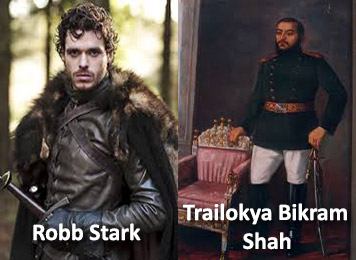
Petyr Baelish (Little Finger): A trusted but secretly treacherous advisor to a treacherous queen looking to eliminate her perceived enemies no matter the consequences. After the Queen’s favorite courtier Gagan Singh was killed, Bijayraj Pandit, another courtier but of the non-military background was involved in plans to assassinate Jung Bahadur along with his brothers and supporters. He projected an image of a weak person and was underrated by many of his contemporaries. He was tasked to invite Junga Bahadur for an emergency meeting at a location where assassins would be waiting but instead reveals all the plans and even assists Jung Bahadur to set up a counter-ambush. The ensuing massacre would later be famous as Bhandarkhal parva. The personification of double-dealing, he can easily be compared to Little Finger.
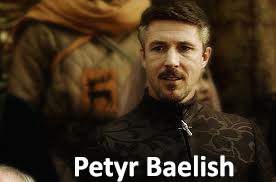
Red Wedding & Kot Parva / Bhandarkhal Parva: Anyone familiar with the famous Red Wedding episode in Game of Thrones would have been gutted to see the massacre that nearly destroyed a powerful aristocratic clan. It was not just the Starks who were nearly wiped off, many of their loyal soldiers and supporters from other clans were also wiped off. In Kot Parva, it was the Pandes who were murdered in mass from which they never recovered their high influence and position.

It was Jung Bahadur himself who was behind the assassination of the Queen’s favorite courtier, General Gagan Singh Bhandari. Upon learning of the murder, the furious Queen, with a naked sword in one hand shouted at Prime Minister and others present to kill all suspected of having a hand in the assassination of Gagan Singh. Due to known enmity between Gagan Singh and Kapardar Bir Kishore Pande, the queen ordered immediate execution of Bir Kishore Pande.
Fearing chaos, Fatteh Jung Shah, Abhiman Singh Basnyat and Dalbhanjan Pande tried to calm the queen and to convince her to initiate investigation first and act rationally. Unsatisfied with the answer when the queen turned away, the prime minister, Abhiman Singh and Dalbhanjan rushed up the stair towards the balcony to meet the queen and then begins fireworks, all three are shot dead along with many others later.
The queen had already issued orders to Jang Bahadur to call an emergency meeting of all courtiers and especially Pandes who she suspected for Gagan’s ill fate. In the ensuing chaos, all prominent Pandes along with their supporters and few Basnyats were wiped off. Families of the massacred would lose all their wealth, and many would be exiled. In total nearly 40 of high personalities and nearly hundreds of their followers and soldiers would be executed.
The massacre was significant in terms of the number of authorities killed and the political chaos it generated. The most significant outcome was the rise of Jung Bahadur.
Bhandarkhal Parva
While the Pandes were dealt with, another power opposing group to Jung Bahadur were Basnyats. By then it was apparent to at least a few that it was Jung Bahadur behind it all. Even his uncle Mathbar Singh Thapa made public statements accusing Jung Bahadur of killing Gagan Singh and others who followed. Thanks to this, Mathbar himself would be shot by Jung Bahadur himself, which he later admitted to doing.
The Queen who gets snubbed by Jung Bahadur after Kot Parva and his rise in power soon realized her mistake. Anyone remember Cercei promoting the High Sparrow only to be betrayed later? She teamed up with Bajir Singh, son of Gagan Singh and remaining Basnyats. An ambush was set up at the Royal garden of Bhandarkhal. A prominent personality of this conspiracy, which also came to be known Basnyat Conspiracy due to the high number of participants from Basnyat clan in the plot, Bijayraj Pandit disclosed all the details to Jung Bahadur who then accepted the invitation but attended with a large entourage of soldiers who finished off the Basnyats. Like Pandes they never really recovered to the same level of power and influence.





